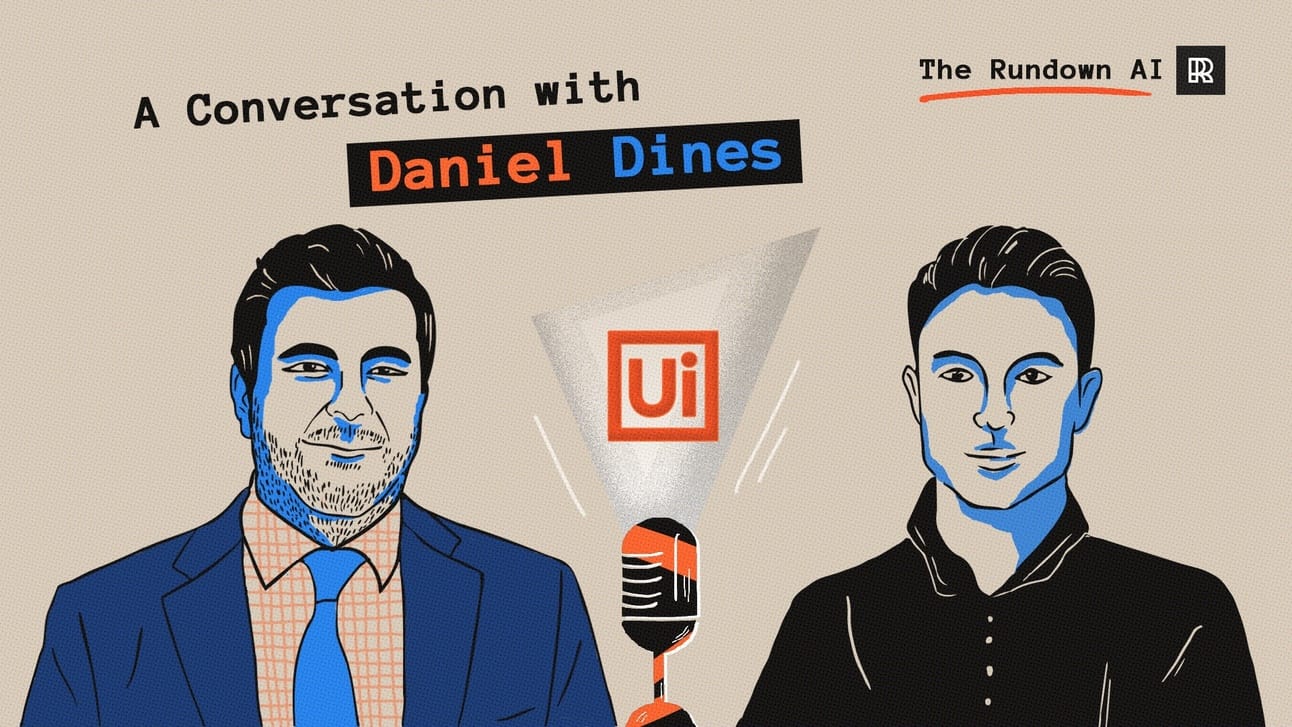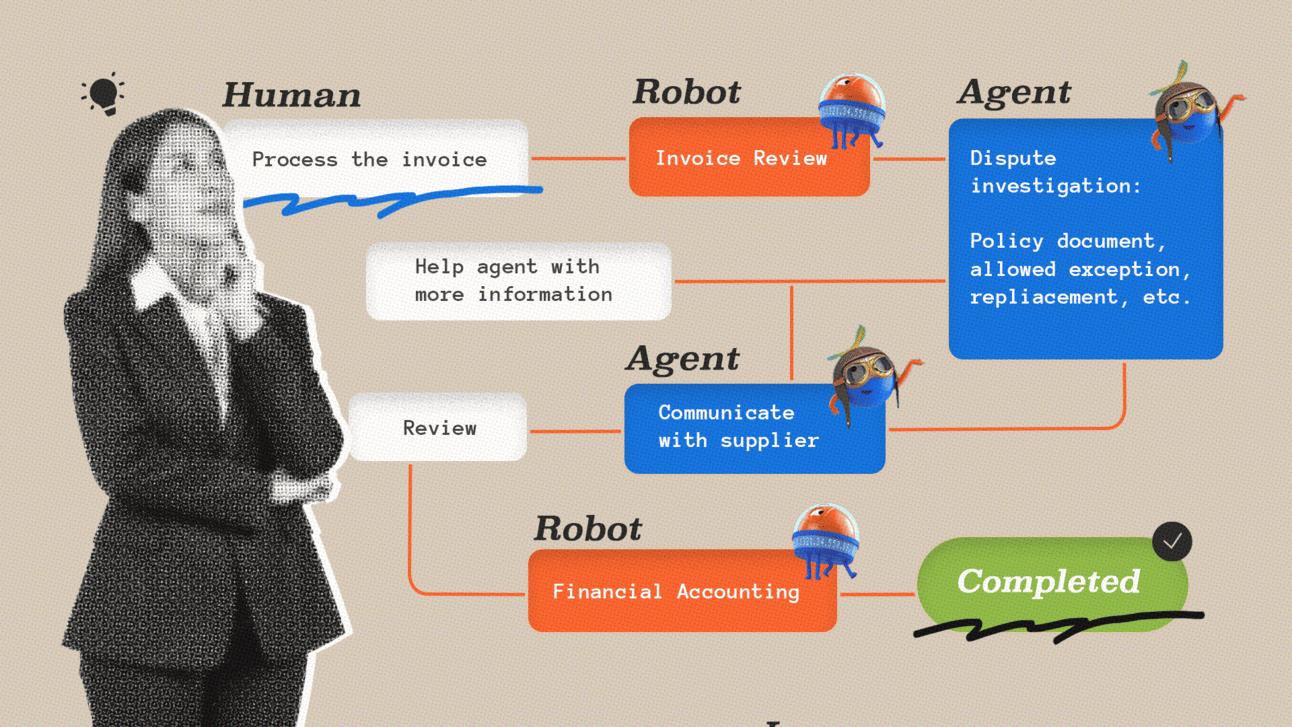Good morning, {{ first_name | AI enthusiasts }}. The software world just got a major agentic upgrade with enterprise automation leader UiPath’s latest announcement.
The company unveiled a new platform for agentic automation that expands the role of digital workers beyond routine tasks — and towards intelligent AI agents that can reason, adapt, and collaborate in more human-like ways.
So, we managed to get together with the company's founder and CEO, Daniel Dines, for an exclusive Q&A on how this innovation could transform the future of work!
In today’s AI rundown:
A new era of agentic automation
UiPath’s Maestro for seamless orchestration
An open, multi-agent ecosystem
Agentic workflows that businesses trust
Unlocking human potential with AI
EXCLUSIVE Q&A DANIEL DINES
ANNOUNCEMENT

Image credits: Kiki Wu / The Rundown
The Rundown: UiPath, a global leader in agentic automation, just launched its new platform for ‘agentic automation’ designed to orchestrate AI agents, robots, and humans on a single intelligent system to autonomously manage complex tasks across enterprise environments.
Cheung: “Your company was founded on what’s called robotic process automation software, or RPA, but is now AI‑first—how do you define ‘agentic automation’?”
Dines: "Our mission has always been to empower people to free themselves of boring, mundane tasks and instead focus on meaningful work. And today, with the emergence of agentic AI, we can now emulate the human mind and capacity for decision making, ‘agentifying’ robots to automate more complex work.”
Dines added: “Agentic automation combines RPA, AI models, and human expertise into cohesive workflows where all three work together to understand, improve, and automate all kinds of workflows, which drives enterprise efficiency.”
Why it matters: Enterprise automation is no longer just about scripted workflows—it’s about intelligent, adaptive systems that can think, plan, and act. By enabling intelligent collaboration between AI, robots, and people, UiPath’s platform unlocks a new realm of possibilities, accelerating decision-making and driving productivity gains.
ORCHESTRATION

Image credits: Kiki Wu / The Rundown
The Rundown: At the core of this evolution is Maestro, which coordinates AI agents, robots, and humans across business processes — turning static workflows into dynamic streams of events that can adapt to changing conditions in real-time.
Cheung: “UiPath has gone through a major transformation, re-platforming your workflow engine to support agentic automation. Can you break down some of those architectural changes in real-world terms?”
Dines: “To put simply, rather than treating workflows as rigid sequences of steps, we now treat them as streams of events. Every action and decision are recorded immutably, like a real-time system log that’s also the source of truth.”
Dines added: “Maestro is the heart of our new platform—automating, modeling, and optimizing complex business processes end-to-end with built-in process intelligence and KPI monitoring to enable continuous optimization. It gives businesses the control and visibility they need to scale AI safely across teams, systems, and the enterprise.”
Why it matters: Maestro dynamically assigns goals, adapts plans in real-time based on changing conditions, and maintains continuous feedback loops between agents and the environment. It enables automation that is resilient, context-aware, and capable of operating with minimal human intervention.
ECOSYSTEM & PARTNERSHIPS

Image credits: Kiki Wu / The Rundown
The Rundown: Unlike closed competitors, UiPath designed its platform as an open ecosystem that integrates with leading agent frameworks like LangChain, CrewAI and Microsoft — avoiding vendor lock-in while connecting existing tech stacks.
Cheung: "How does UiPath’s open-framework strategy benefit enterprise customers?"
Dines: "The average enterprise relies on more than 175 different applications and systems. To scale AI enterprise-wide, businesses need it to work with their existing solutions and workflows. We like to say that where other companies are building walls around their AI, we’re building bridges.”
Dines added: "Our customers can use AI agents from UiPath, or AI solutions from partners like LangChain or Microsoft. In either scenario, agents can collaborate across systems to manage complex workflows, drive productivity, and ultimately accelerate innovation."
Why it matters: By integrating with leading frameworks, UiPath ensures its platform is not a closed box but a flexible hub. Its collaborative, cross-platform approach accelerates automation adoption, unlocks new use cases, and ensures enterprises can leverage best-in-class AI capabilities wherever they reside.
DATA PRIVACY & TRAINING

Image credits: Kiki Wu / The Rundown
The Rundown: UiPath tackles enterprise AI's biggest adoption barrier—security—with a model where AI agents access data only through rule-based robots, never receiving direct passwords, while an AI Trust Layer automatically masks sensitive information.
Cheung: "With AI models often requiring access to sensitive or proprietary data, what steps does UiPath take to ensure privacy and protections for enterprise customers?”
Dines: “UiPath robots provide the best method to ensure controlled data access for AI agents because they are rules-based and retrieve only the data required by the automation.”
Dines added: "Through our platform, agents won’t be given passwords or API tokens; they’ll access enterprise data exclusively via robots. We’ve already implemented the best-in-class, secure way to give our robots access to enterprise systems.”
Dines added: “The UiPath AI Trust Layer includes administrative and usage controls at a granular level. Harmful content filtering is built into and enabled on all third-party models. We also offer personally identifiable information and sensitive data masking.”
Why it matters: Through a robust AI Trust Layer, the platform ensures that agent actions are explainable, auditable, and compliant with enterprise policies. Sensitive data is protected with access controls and secure context passing, while dynamic guardrails and risk management keep autonomous behavior within safe boundaries.
FUTUREPROOFING & EVOLUTION

Image credits: Kiki Wu / The Rundown
The Rundown: As AI models and chips become commoditized, UiPath is positioning itself at the higher-value orchestration layer, with over 5,500 developers already trained on its agentic platform to help workers collaborate with AI agents more meaningfully.
Cheung: “How do you see the role of employees evolving as automation and AI become more deeply integrated into business processes? What cultural challenges will enterprises face, and how is UiPath helping them prepare?”
Dines: “To prepare people for this new way of working, we offer a variety of training courses through UiPath Academy—already more than 5,500 Academy developer courses on agentic automation have been completed, and more than 450 partners have begun their agentic automation courses.”
Dines added: "I am incredibly confident that over the next year, enterprises will be able to unlock the power of AI agents through agentic automation—unleashing human potential, driving innovation, and transforming the ways we work and live for the better. We’re only just getting started.”
Why it matters: Dines says UiPath started in 2005 with the belief that people “deserve more rewarding work,” and today, that is possible. Agentic automation is set to redefine how we work, with people working synergistically with agents and robots to execute processes faster and more intelligently than ever before.
GO DEEPER
LIVECAST REPLAY
If you want to learn more, you can watch the global reveal of the UiPath Platform for agentic automation here and tune in to hear from customers and partners at the UiPath DevCon virtual event on May 14.


